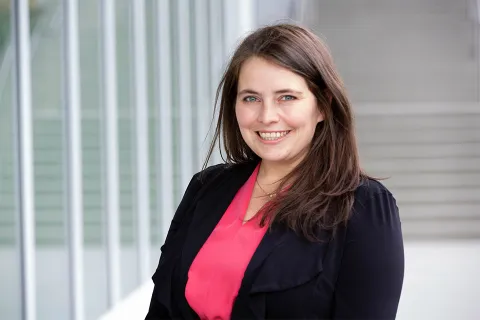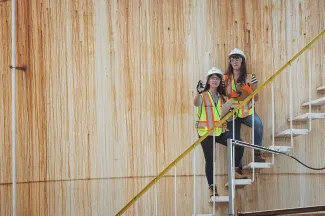Asked to describe her work, Dr. Lisa Tobber says “I study how buildings will behave in earthquakes and then develop solutions to make them behave better.” Her research on structural systems is making our cities safer, more resilient and more sustainable.

- Program:
- Campus: Okanagan
Website: School Profile
Education: PhD in Structural Engineering (UBC); BASc in Civil Engineering (UBC)
Tell us about your research.
"The short answer is that I study how buildings will behave in earthquakes and then develop solutions to make them behave better.”
As a structural engineer, I design the skeleton of a building so that it will stay up under the weight of the building and against the forces of wind and earthquakes. It’s extremely challenging, because unlike other kinds of research where you can test out your ideas on prototypes, we can’t test buildings in the same way and can only see our handiwork after there’s been a disaster. I’m also researching more sustainable types of concrete that have a lower environmental impact.
Why is your research important?
“This research is important because it saves lives and creates buildings that are more resilient to climate change and natural disasters.”
The knowledge generated by structural engineering research is being integrated into building codes and reducing the number of building collapses and deaths after earthquakes.
However, there is definitely more that we could be doing, particularly in the area of resiliency and functionality after an earthquake. Buildings in Canada must be designed to stay intact after an earthquake, which doesn’t necessarily mean they’ll be safe to live in. We saw after the Christchurch, New Zealand, earthquake that 60 per cent of buildings in the downtown district needed to be demolished because they weren’t safe to live in or work in. If there is a major earthquake here in BC, there could be hundreds of thousands of people who are suddenly homeless because it’s not safe for them to return to their mid- or high-rise building. (Read more about Dr. Tobber’s contributions in the article Why new research in concrete could save BC homes.)
How does your research influence your teaching?
As a student at UBC I was lucky to learn from the nation’s pre-eminent researchers in earthquake engineering. That gave me a very strong understanding of how buildings perform in earthquakes and a fantastic foundation for my work. Now a researcher myself, I discuss my work with my students and incorporate it in my classes. My students are certainly familiar with my dislike of various aspects of the building code and my attempts to change it.
There’s currently an emphasis on Indigenizing the curriculum at UBC, and I’m working on a research project looking at the intersections of Indigenous design, structural engineering and material engineering. I’ll be learning about these areas of overlap and integration, which I can then bring into in my classes and teach to my students based on my experience.
Indigenizing the Engineering Profession
You mentioned an influential undergraduate research project. Do you have undergrads working in your lab?
Yes. Instead of a co-op term, students can work in my lab on a research project. They’ll typically work with a graduate student on testing, doing drawings or conducting literature reviews. This sees them working on interesting projects and learning cutting-edge technology.
ASSET Group website Research Work Experience
Anything else you want to share?
Engineering is a great four-year professional degree. Even if you are considering other professions – like teaching, medicine, architecture, law or virtually anything else that requires additional schooling beyond undergrad – why not get an engineering degree first? You’ll become really good at solving problems, which is a skill you can use in any field. I know some people who did engineering followed by a law degree and are now in high demand in patent, technology and construction law. A strong applied science background can also set you up for success in business, management and politics. Our province’s Minister of Emergency Management and Climate Readiness is an alumna of UBC Civil Engineering.









